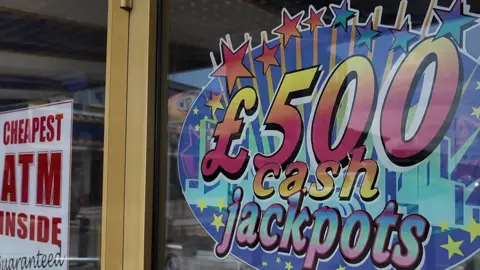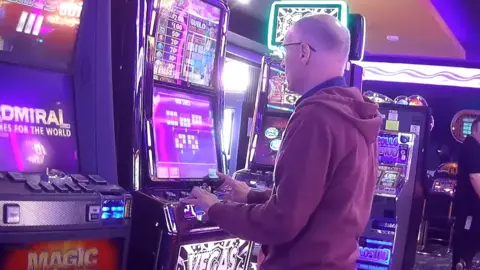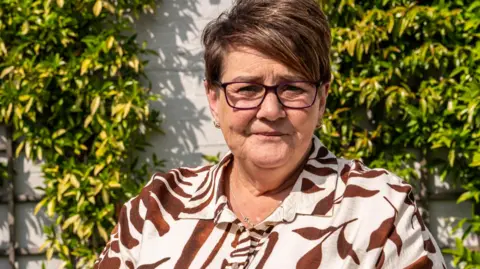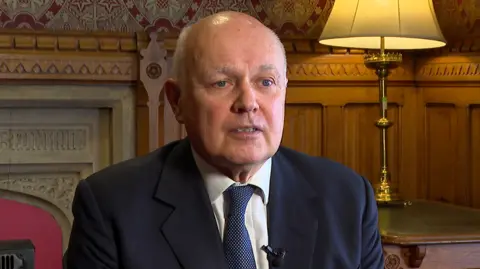Gambling centres 'failing to protect' addicts
 BBC
BBCSchemes to stop problem gamblers using slot machines offering the hope of quick cash are often not being properly enforced, a BBC investigation has found.
Only one out of 14 Adult Gaming Centres (AGC) in Portsmouth visited by an undercover reporter who had registered with a self-exclusion scheme declined him entry.
Addicts have said "loopholes" and a lack of staff training mean people signed up to the schemes are being allowed to build up further debts.
The Gambling Commission has launched its own investigation, describing the BBC findings as "very concerning".
There are nearly 1,500 adult-only gaming centres in Britain, with some open for 24 hours every day.
Their machines see players spending up to £2 a spin, which lasts just two and a half seconds.
Games like Luck of the Irish and Rainbow Riches are fast and noisy with payouts of up to £500.
But critics say they are targeting the poorest people in the UK, encouraging problem gambling, and leaving the most vulnerable in danger of losing everything.
To try to get control of their gambling addictions, people can apply to join a self-exclusion scheme at an AGC venue where you complete an application form and have your photo taken.
These are then shared with other AGCs within a 1km radius - or can be extended further afield by calling a helpline.
If the person tries to enter any of these premises within the zone, they should then be asked to leave.
There are two exclusion schemes - one called SmartEXCLUSION and another run by the AGC trade body, the British Amusement Catering Trades Association (Bacta).

As part of a File on 4 investigation, BBC undercover reporter Greg Clark obtained a self-exclusion and extended it to a 40km radius of Portsmouth, a city with one of the highest numbers of AGCs in the country.
He entered premises in London Road, aiming to play on slot machines for a minimum of 20 minutes, and ensuring he was in full view of the staff.
He visited three venues in one morning - none turned him away.
A fourth, Game Nation, checked his ID and discovered he had self-excluded. He was asked to leave.
According to the Gambling Commission, details of anyone who has tried to breach their self-exclusion should immediately be shared with other nearby venues - putting them on high alert.
However when the reporter went to another AGC on London Road, he was welcomed in.
The BBC has since learned that two of the premises visited in Portsmouth were not signed up to a self-exclusion scheme at all.
If a venue is not part of a scheme, it is in breach of its license. The BBC understands that both of those venues two are now working with a self-exclusion scheme.
On average, each high-stakes machine in the UK pulls in about £32,000 each year - almost as much as the average salary.
Dr Matt Gaskell, a consultant psychologist and head of the NHS Northern Gambling Service, said: "The data is there, it's very clear.
"So it is targeting the most vulnerable people in our communities who could least withstand the harm as it ensues and perhaps might look to the hope of winning on gambling because of their personal circumstances in socially stressed communities."
 Bhasker Solanki
Bhasker SolankiFor those struggling with long-term gambling addictions, including Tracy Page, 51, from Droitwich in Worcestershire, the self-exclusion schemes "don't work".
She started gambling at bingo with friends and family, but when she went through a tough time in her personal life, her gambling became more frequent and excessive.
Things came to a head when she began visiting AGCs.
"I didn't feel like an addict. I just thought that was just my thing," she said.
"And then you start to realise 'I'm not just going once a week, I'm going two, three, four times a week'.
"Then you're getting to the point where you can't pay your bills.
"It fails, there are too many gaps, too many loopholes and I don't believe staff have got the knowledge or the training to be able to say you need to step away."

Conservative MP Sir Iain Duncan Smith, chairman of the All-Party Parliamentary Group for gambling reform, said a lack of enforcement meant AGC companies "don't really care".
He said local authorities and the Gambling Commission should have greater powers to intervene if abuses were happening.
"Most of all we do need to see inspections of those properties," he said.
"They're not onerous, for just checking that what they're actually doing is what they're meant to do, and they're not doing stuff which is marginally illegal."
Tim Miller, executive director of industry regulator the Gambling Commission, said: "I'm really concerned at what you found on the face of it.
"It points to self-exclusion schemes not being implemented properly at that local level.
"Where we see evidence that gambling companies are not meeting their regulatory expectations will take really robust action against them.
'You should be monitoring what's going on in your premises. So if you spot someone that matches one of those photos, you should step in.
"Not just stopping them from gambling, but providing them with referral to appropriate support as well.
"The onus is absolutely on the gambling company and the people within it to spot that individual."
He added that local authorities that licenced premises in their areas were funded through the licence fees to inspect gambling businesses to ensure they were compliant.
The Department of Culture Media and Sport said: "Adult gaming centres and bingo venues make valuable contributions to the local economy of towns and cities across the country, but it is vitally important that the sector protects vulnerable people.
"Where operators fail to uphold effective self exclusion schemes, regulatory action will be taken by the Gambling Commission.
"We continue to work with the land-based gambling sector to mitigate the risks of harmful gambling and will be seeking further assurances from the adult gaming sector to ensure high standards of regulatory compliance."
File on 4 Investigates Adult Gaming Centres will be on Radio 4 at 20:00 BST on Tuesday.
If you have been affected by any of the issues in this story, BBC Actionline has help and advice on addiction and gambling.
You can follow BBC Hampshire & Isle of Wight on Facebook, X (Twitter), or Instagram.
